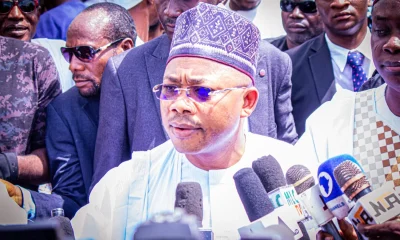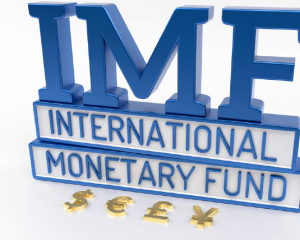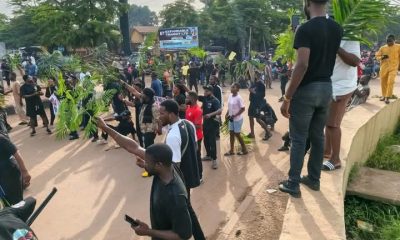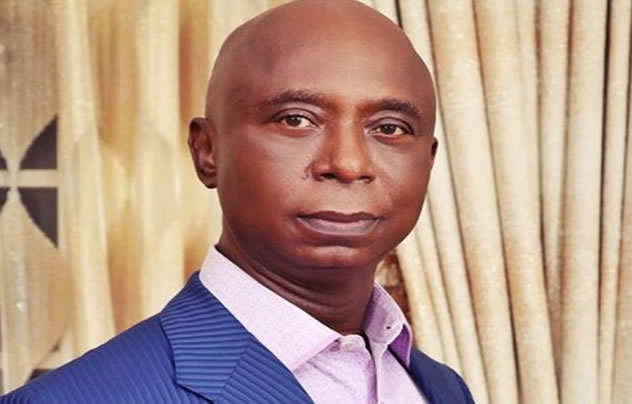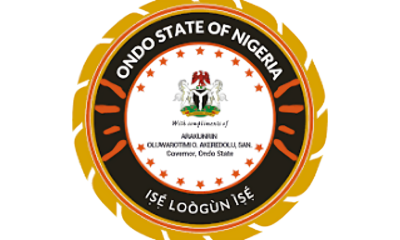BUSINESS
Nigeria’s Debt Rises by 226% in Past Seven Years – Report

.Climbs from N12.5trn in June 2015 to N39.56trn by Dec 2021
With analysts in the financial service sector impressing it on the federal government to slow down on its borrowing, it has emerged that Nigeria’s debt rose steeply by a whooping 226 per cent in seven years.
In a report, analysts at Agusto & Co.
Agusto & Co. highlighted this in its May 2022 economic newsletter titled, “Fiscal Consolidation and Debt Sustainability- Beyond the Rhetoric.”
Agusto & Co. urged the electorate to question how the next administration intends to approach fiscal consolidation and debt sustainability in the face of revenue constraints.
It stated: “The last seven years have seen Nigeria’s public debt burden skyrocket with minimal investments in infrastructure to show for it. While the Federal Government of Nigeria’s capital expenditure averaged N1.6 trillion ($3.85 billion at N415/$) over the last seven years, it has lagged behind both budgeted levels and the amount required to close the infrastructure gap estimated at $150 billion annually over the next 30 years.
“It also pales in significance when compared with its regional peers. However, during the same period, total public debt has soared by a staggering 226 per cent to N39.56 trillion in December 2021, up from N12.5 trillion in June 2015.”
It emphasised that a bloated wage bill and interest payments cumulatively 114 per cent of FGN revenue in 2021 continue to consume a substantial portion of the nation’s finances.
It added, “For more context, Nigeria spent more on non-debt recurrent expenditure in 2021 approximately N5 trillion, than its estimated revenue of N4.39 trillion within the period. This implies that it had to borrow to meet a considerable part of the public sector wage bill and its actual capital expenditure in 2021 is estimated at N3.7 trillion. Revenue growth has been significantly outpaced by the rise in expenditure. The fiscal deficit-to-GDP ratio of 6.3 per cent in 2021 has now exceeded its 3 per cent threshold over the past 5 years. The country’s revenue troubles have also been exacerbated by production and terminal shut-ins that have stopped Nigeria from benefiting from what should have been a crude oil windfall.”
The report however noted that recent efforts at tax reforms, while commendable, have been largely fixated on raising the tax rate and introducing new taxes but however noted that emphasis should be more on increasing the tax bracket.
It stated, “The phased increase of the excise duty on tobacco and alcoholic beverages between 2018 and 2020 in addition to the 50 per cent increase in Value Added Tax (VAT), from 5 per cent to 7.5 per cent in 2020, failed to yield a significant impact as the average Nigerian consumer continues to grapple with falling purchasing power and stagnating incomes.
“We believe that the revenue problem would be addressed more effectively if fiscal reforms were directed at broadening the tax base and capturing the informal economy (estimated to be around 65 per cent of GDP by the International Monetary Fund (IMF), as opposed to intensifying efforts to impose additional taxes on those already subject to taxation. The reality is that many informal businesses are compelled to pay levies, albeit informally and frequently to agents, commissioned by governments at the sub-national level, who remit agreed-upon sums to the authorities.”
“In many instances, these levies are collected regardless of whether or not the informal business earns revenue; they are compelled to comply by the prospect of force or loss and typically receive little benefit from these non-state collectors. These informal levies have also been observed to constitute a larger proportion of their incomes as they contend with multiple levies from all tiers of government. The International Center for Investigative Reporting (ICIR) estimates that Lagos State National Union of Road Transport Workers (NURTW) rakes in over N123 billion annually.
“Significantly increased domestic revenue mobilisation is essential for decreasing budgetary risks and creating policy space. Key near-term actions would include the permanent withdrawal of fuel subsidies in accordance with the Petroleum Industry Act (PIA), together with compensation measures for the poor and the efficient and transparent use of the saved resources, ”the report stated.
Oil & Gas
NNPC Ltd. Records N5.8bn revenue, N748bn PAT in April

The Nigerian National Petroleum Company Limited (NNPC Ltd.) has announced a revenue of N5.89 billion and a Profit After Tax (PAT) of N748 billion for the month of April.
The NNPC Ltd. disclosed this in its Monthly Report Summary for April, released on Thursday.
The report highlights key statistics, including crude oil and condensate production, natural gas output, revenue, profit after tax and strategic initiatives during the period.
The report said that NNPC Ltd made statutory payments of N4.
22 billion between January and March.According to the report, crude oil and gas figures are provisional and reflect only NNPC Limited’s data.
It said that It excluded volumes of independent operators reported by the Nigerian Upstream Petroleum Regulatory Commission (NUPRC).
“Crude oil and condensate production averaged 1.606 million barrels per day (bpd) in April, while natural gas production was 7.354 million standard cubic feet daily.
“Petrol availability at the NNPC Ltd. retail stations recorded 54 per cent during the month under review, while upstream pipeline reliability was 97 per cent,” it said.
On its strategic efforts, it said that the company was collaborating with Venture Partners to accelerate Sustainable Production Enhancement.
It said that it completed the implementation of relevant presidential directives and Executive Orders for its upstream operations.
The report listed some Technical Interventions on Ajaokuta-Kaduna-Kano (AKK) pipeline and the Obiafu-Obrikom-Oben (OB3) gas pipelin to resolve challenges of River Niger crossings.
It said that the OB3 gas pipeline project was 95 per cent completed in the month, while the AKK pipeline was 70 per cent completed.
The report said that Turnaround Maintenance (TAM) was completed in several Oil Mining Leases (OML), including OML 18, OML 58, OML 118, and OML 133.
On Refineries Status, it said that the Port Harcourt Refinery Company (PHRC), as well as the Warri and Kaduna refineries were currently under review.
According to the report, all financial figures are provisional and unaudited, and all operational and financial data are for April unless indicated otherwise. (NAN)
Economy
Tinubu’s Democracy Speech Reflects Ambitious Vision – LCCI

The Lagos Chamber of Commerce and Industry (LCCI) says President Bola Tinubu’s Democracy Day speech reflects an ambitious and optimistic vision for Nigeria.
In a statement in Lagos on Thursday, the Director-General of LCCI, Dr Chinyere Almona, said the speech showed government’s appreciation of democracy, economic development, security and social cohesion.
Almona said that the President’s focus on economic growth, improving security, and increasing funding for education, healthcare, and infrastructure promised improved economic performance in the near future.
“We join all Nigerians to celebrate the peaceful transition and commitment to democratic values in the past 26 years.
“A stable political environment is very crucial for business success and for attracting investments.
“Government must stay committed to executing all its proposed programmes and ongoing reforms to ensure Nigerians reap the benefits of democracy without further delay,” she said.
The director-general also urged the government to ensure clear and consistent communication about economic reforms and policies to businesses and the general public.
This, she stated, would reduce uncertainty, build confidence and establish transparent mechanisms for tracking and reporting progress made through reforms.
Almona also called for targeted support for businesses to reduce their cost burdens relating to energy, logistics and regulatory compliance.
She said that LCCI recommended non-cash interventions that could ease the harsh production environment.
Almona also advocated expansion of social safety net programmes to support households affected by high living costs and inflation.
She also called for a more collaborative environment among government, businesses, the civil society and labour unions to ensure fair and timely negotiations on wages and working conditions.
She said that the government must implement programmes that would support strategic sectors pivotal to job creation, tax revenues and infrastructure development.
According to her, the oil and gas, power, and agriculture sectors require special attention as they offer catalytic support to the economy.
“As Nigeria reflects on the progress made and the path ahead, we urge government to remain steadfast about implementing all the required reforms toward a more sustainable and resilient economy.
“We call on government to work toward a nation built on the rule of law, justice and social cohesion even in our diversity and political sophistication,” she said. (NAN)
Economy
World Bank Cuts Global Growth Forecast to 2.3% for 2025

Global economic growth is projected to slow to 2.3 per cent in 2025 due to mounting trade tensions and persistent policy uncertainty, according to the World Bank’s latest Global Economic Prospects report.
A statement from the bank’s Online Media Briefing Centre on Tuesday noted that the new forecast was nearly half a percentage point lower than the rate projected at the beginning of the year.
The report indicated that the slowdown would mark the weakest non-recessionary global growth since 2008.
“The turmoil has resulted in growth forecasts being cut in nearly 70 per cent of all economies, across all regions and income groups,” the report states.
In spite of the gloomy outlook, a global recession is not anticipated. However, if current projections hold, average global growth in the first seven years of the 2020s would be the slowest of any decade since the 1960s.
Indermit Gill, the World Bank Group’s Chief Economist and Senior Vice-President for Development Economics, warned of deepening stagnation in the developing world.
“Outside of Asia, the developing world is becoming a development-free zone. It has been advertising itself for more than a decade,” he said.
Gill noted that growth in developing economies had declined steadily, from 6 per cent annually in the 2000s, to 5 per cent in the 2010s, and to under 4 per cent in the 2020s.
This trend mirrored the slowdown in global trade, which fell from an average of 5 per cent in the 2000s to under 3 per cent today. Investment growth had also weakened, while debt had surged to record levels.
The report projected that growth would slow in nearly 60 per cent of developing economies in 2025, averaging 3.8 per cent before a modest rise to 3.9 per cent in 2026 and 2027.
The report added that more than a full percentage point below the average of the 2010s.
“Growth in low-income countries is expected to reach 5.3 per cent in 2025, a 0.4 percentage point downgrade from earlier forecasts.
“Tariff hikes and tight labor markets are expected to keep global inflation elevated, with a projected average of 2.9 per cent in 2025, still above pre-pandemic levels.”
The World Bank warned that slowing growth would hinder efforts by developing economies to create jobs, reduce poverty, and close the income gap with advanced economies.
“Per capita income growth in these economies is forecast at 2.9 per cent in 2025, 1.1 percentage points below the 2000–2019 average.
“Assuming developing countries (excluding China) maintain a GDP growth rate of 4 per cent the forecast for 2027, it would take them about two decades to return to their pre-pandemic growth trajectory.”
Still, the report noted that global growth could rebound more quickly if major economies reduced trade tensions.
It said that resolving current disputes and halving tariffs could boost global growth by 0.2 percentage points over 2025 and 2026.
In response to rising protectionism, the World Bank urged developing economies to diversify trade, pursue strategic partnerships, and engage in regional agreements.
Given constrained public resources and growing development needs, policymakers are encouraged to mobilise domestic revenue, prioritise spending for the most vulnerable, and enhance fiscal management.
To drive sustainable growth, the report emphasised the need to improve business environments, expand productive employment, and align workforce skills with market demands.
Finally, it highlighted the importance of global cooperation in supporting the most vulnerable economies through multilateral initiatives, concessional financing, and targeted relief for countries affected by conflict.(NAN)

